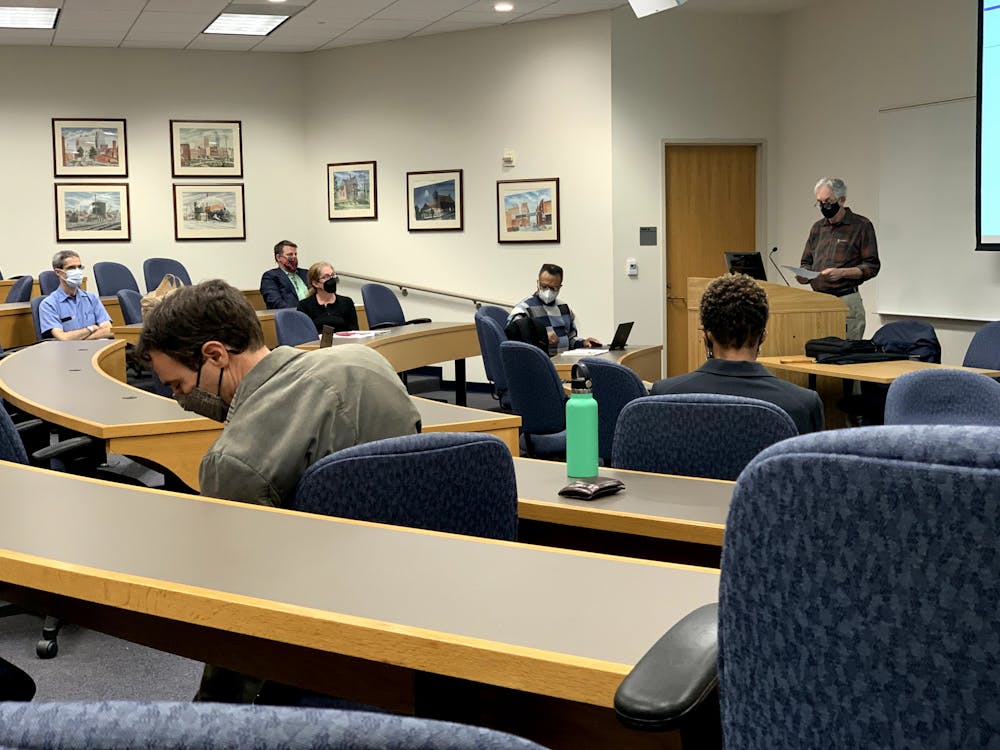The Arts & Sciences Council approved a new minor and heard a proposal for a new certificate in health policy at their Thursday meeting.
At the beginning of the meeting, the Council approved a new minor titled “Artificial Intelligence: Applications and Implications,” to be housed in the computer science department. The vote was passed with an overwhelming majority.
Nathan Boucher, associate research professor in the Sanford School of Public Policy, presented the plan for the potential health policy certificate. The proposed certificate program is a joint venture between Sanford and the Duke-Margolis Center for Health Policy and is experiential in nature.
“We have increasing support from students seeking health policy as a way to expand their skills and possibly a career track,” Boucher said. “Those students have pointed out, and we agree, that what we currently have doesn’t meet what the students would like.”
The program would be composed of six components, as all certificate programs at Duke are. The first of these components is an introductory course—PUBPOL 165: Introduction to the United States Healthcare System—which is already offered in the Sanford School.
Another two would be elective courses, chosen from a list of approved choices that span a variety of disciplines, according to Boucher. Traditional certificates require four electives, but because this is a proposed experiential certificate, there will be two “thematic experiences” required of students instead.
“The thematic experiences will be a 300-plus hour experience and a 150-plus hour experience,” said Boucher, adding that there are a wide array of possibilities that students already commonly pursue which could satisfy these requirements, ranging from a Bass Connections research project focused on health policy to an internship with a health policy agency.
The final component is a capstone class that ties the previous five experiences together.
However, faculty on the Council were skeptical that the new certificate was not all too different from pursuing the public policy major with a focus on health policy, or independently pursuing classes and opportunities related to health policy.
Professor of Cultural Anthropology Lee Baker noted that the required introductory course is already an elective choice for undergraduate public policy students. He also wondered whether the required internship public policy students must complete could count for the health policy certificate as well, adding that the certificate program in innovation and entrepreneurship has adopted this policy.
Sherryl Broverman, professor of the practice of biology, agreed with Baker.
“If [interested students] are already taking [Introduction to the United States Healthcare System] and they're already doing all this experiential learning, the value added is just the capstone of bringing this all together,” Broverman said. “The students [who want to study health policy] are already doing many of these things already, so what do you see as a great value?”
Along with the capstone, Boucher said that there were two key benefits to the certificate program and that the certificate would largely serve those undergraduates who aren’t majoring in public policy studies. First, through the certificate, students would have an advisor to help them navigate health-policy related opportunities inside and outside of the classroom. The second benefit, Boucher said, would be that students could receive a credential in health policy on their transcript.
Broverman disagreed with the utility of the second point.
“There's a large conversation going on in the Arts & Sciences Council about trying to get students away from credentialing,” she said. “The idea to swap more credentials and put them [on a diploma], I think it's something I would be wary of going down that pathway.”
The Council will vote on the proposal for the certificate at their meeting April 28.
In other business
Jose Gonzalez, associate professor of classical studies, updated the Council on behalf of the Committee on Global Education. Gonzalez said that the Committee has begun a study on undergraduate involvement in global education, particularly with respect to how it shifts based on major and school, among other factors. He also added that participation in study abroad has gone up by 20% compared to what it was before the beginning of the pandemic, referring to this as an “obvious pent up demand for global education for the students.”
Professor of Economics Thomas Nechyba presented an update from the Committee on Assessment on the new course evaluation system that went into place last semester for the Trinity College of Arts & Sciences.
Nechyba said that the new system was largely successful both in terms of quantity and quality of the responses, which was consistent with what faculty noticed. One of the key improvements Nechyba noticed was the degree to which course evaluations are being shared with students. He added that the vast majority of comments provided to instructors have been constructive, but one area of concern for him is detecting implicit bias that may be in responses that students give to faculty of different demographics.
“The question of whether there's bias based on various forms of identity is a much deeper question … Any evidence that we looked at here has nothing to say about that,” Nechyba said. “... [But] we as a committee believe that there is bias. We think the scientific evidence is there. We think people's lived experiences tell us that it's there. So we believe it is there. We just don't believe we can measure it from the data that we have.”
Trinity Dean Valerie Ashby discussed how Trinity can better support graduate education. She stated that a dichotomy exists because graduate student affairs are more or less handled by the Graduate School, whereas the faculty that the students receive training from are not. Instead, they are affiliated with either of the two undergraduate colleges or a professional school. Ashby highlighted the role of the new graduate dean, whose job it is to soften this divide.
Get The Chronicle straight to your inbox
Signup for our weekly newsletter. Cancel at any time.

Adway S. Wadekar is a Trinity junior and former news editor of The Chronicle's 119th volume.

